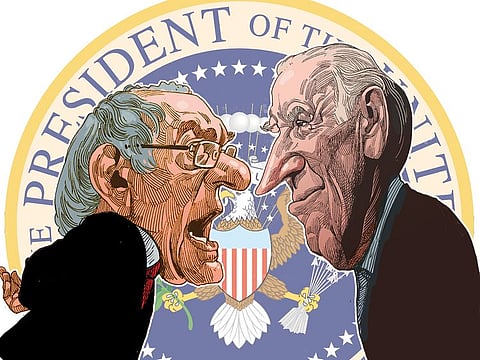Biden or Sanders: Democrats zero in on their nominee
Finally we will have a nominee with the conventional qualifications to take on Trump

With the billionaire investor Tom Steyer dropping out of the Democratic presidential nominating contest on Saturday, former South Bend, Indiana Mayor Pete Buttigieg following him on Sunday and Senator Amy Klobuchar of Minnesota joining them on Monday, it’s now pretty clear that the same incentives that have pushed out candidates in previous election cycles are still operating in 2020.
Now there are only two serious long-shot candidates left in this week’s Super Tuesday contests to challenge the two front-runners, Senator Bernie Sanders of Vermont and former Vice President Joe Biden. They are Senator Elizabeth Warren of Massachusetts and former New York Mayor Michael Bloomberg, and it seems likely that if the polls are correct and they do poorly that they, too, will exit rather than staying in as spoilers.
Bloomberg, the founder and majority owner of Bloomberg LP, said on Monday that he is still “in it to win it,” but all candidates say they’re never going to drop out until they actually do.
Now there are only two serious long-shot candidates left in this week’s Super Tuesday contests to challenge the two front-runners, Senator Bernie Sanders of Vermont and former Vice President Joe Biden
Buttigieg managed to go from small-city mayor to winner of the Iowa caucuses on Feb. 3, and he finished a strong second in the New Hampshire primary the following week.
I wasn’t a fan of his Washington-bashing, but he ran a respectable campaign, with solid policy proposals that received good reviews from wonks and an occasional eloquence on the stump that few of this year’s candidates really aspired to. As the first openly gay major presidential candidate, he was a terrific role model and a great story.
Klobuchar has less to show for her effort — just a third-place showing in New Hampshire — but even more than Buttigieg, she is entitled to reflect on what could have been. If only her well received debate performance in New Hampshire had come before Iowa!
Traditional age range
We’ll never know whether there might have been a way for her to translate even better showings in Iowa and New Hampshire into greater success with Latino and black voters in Nevada and South Carolina, where she ended up in the low single digits, but as it was her double-digit success in those first two contests was too late and too mild to allow her to get fully up to speed in the next two states.
Klobuchar always made sense as one of the “normal” candidates in the field — that is, a candidate with conventional qualifications for the presidency, policy positions that reflected party orthodoxy, and falling within a traditional age range for a nominee. Of the candidates with all those qualities, it was Klobuchar who lasted the longest, and she deserves credit for it.
She may even get a vice-presidential tab as a reward. Biden and Sanders should both be looking for someone from a swing state who has been vetted by a presidential campaign, and there may be pressure from energised women within the party to avoid an all-male ticket.
A party represented by Buttigieg and Klobuchar is in good shape. I can’t say good things about Steyer, however. His record over the last few years is almost entirely negative.
He cheapened impeachment by demanding it before the evidence was in; advocated crackpot democratic ‘reforms’ such as congressional term limits and nationwide referendums; tried to buy an office he was unqualified to hold; and hurt his own party’s advocates of policies to fight climate change by running a sure-loser campaign built heavily on that topic.
Best known candidates
Nomination politics are complicated, and it’s hard to draw direct causal lines between one thing and another, but I suspect that Steyer was quite a bit more disruptive than people realise.
He was outspending the other candidates in all four early states by large amounts, and that made it harder for Buttigieg, Klobuchar, Warren, and others such as Senators Cory Booker of New Jersey and Kamala Harris of California to get traction in any of those states. That, in turn, probably had the effect of boosting the best-known candidates, Sanders and Biden.
Some of the same criticisms could be made of Bloomberg, but he has significant experience as an elected official and demonstrated considerable support from party actors. The good news? Despite speculation to the contrary at the beginning of the cycle — early prognosticators floated the idea that Oprah Winfrey or Mark Cuban might be nominated — Democratic party actors and Democratic voters proved uninterested in unqualified candidates attempting to use celebrity, wealth or charm to win a presidential nomination.
We don’t know how the Democratic nomination will turn out, but we do now know that there will be a nominee with conventional qualifications for the job. Alas, that’s no guarantee of success in office. But at least it gives a new president a fighting chance.
Jonathan Bernstein is an opinion columnist covering politics and policy. He taught political science at the University of Texas at San Antonio and DePauw University.
(c) 2020 Bloomberg L.P.



